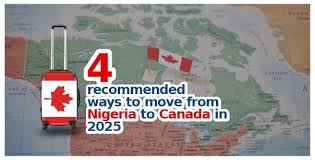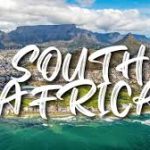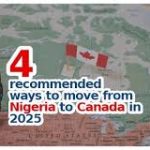How to Travel to Canada from Nigeria in 2025 — a practical, step-by-step guide
Planning a trip to Canada from Nigeria in 2025? Whether you’re going for tourism, to visit family, to study, or to work temporarily, the process has a few mandatory steps, some recent policy changes to watch, and several practical bits that will make your journey smoother.
This guide walks you through everything from choosing the correct visa stream, to applying, to arriving in Canada — with checklists, timelines, and tips tailored for applicants applying from Nigeria. Where useful, I link directly to official sources so you can confirm the latest details before you apply.
Quick overview — which route fits your trip?
-
Visitor (Tourist) Visa / Temporary Resident Visa (TRV) — For short trips: tourism, visiting friends/family, business visits. Most Nigerian citizens need a TRV to fly to Canada.
-
Study Permit — If you will study full-time at a designated learning institution (DLI). You must be accepted to a DLI before applying. Canada.ca
-
Work Permit — Employer-specific or open work permits (depending on the program). Many work streams require an LMIA or rely on employer exemptions; some high-skill programs offer faster processing (Global Skills Strategy).
-
eTA (Electronic Travel Authorization) — Most visa-exempt travelers flying to Canada need an eTA, but Nigerian passport holders are not visa-exempt and generally require a TRV. Always double-check entry rules for your passport type.
Step 1: Decide the correct application type and prepare early
Pick the right application (visitor, study permit, or work permit). Each stream has different eligibility and documentary requirements:
-
Visitor visa (TRV): proof of purpose of visit, funds, ties to Nigeria, travel documents, photos, biometrics. You must convince the officer you’ll leave Canada at the end of your visit.
-
Study permit: valid letter of acceptance from a DLI, proof of funds (tuition + living expenses + return travel), identity docs, police certificates/medical exam if required. Apply as soon as you have your acceptance.
-
Work permit: job offer, LMIA if required (or proof you’re LMIA-exempt), employer compliance documents, and sometimes proof of qualifications. Programs like the Global Skills Strategy can speed up processing for eligible roles.
Start gathering documents well in advance — at least 2–4 months before your intended travel date for visitor and study applications, and earlier for some work streams. For study permits many institutions advise applying 3–4 months before your program start.
Step 2: Create your IRCC account and start the online application
Canada encourages online applications through the IRCC Portal (or the IRCC secure account). The online application process guides you through forms and document uploads. For some visa types, you can still apply on paper but online is faster and recommended. Follow IRCC instructions exactly; missing documents are the top cause of delays.
Practical tips:
-
Scan clear color copies of your passport data page, admission letter (if applying for study), job offer or LMIA (for work), bank statements (clear dates and balances), and supporting identity docs.
-
Use PDF/JPG formats with file sizes as specified. Name files descriptively.
-
Pay fees online with a debit/credit card — keep receipts.
Step 3: Biometrics, VAC appointment and VFS in Nigeria
After you submit your application, you will usually be asked to provide biometrics (fingerprints + photo). Biometrics collection is done at visa application centres (VACs). In Nigeria, VFS Global operates VACs (e.g., Lagos and Abuja) that handle biometrics and document submission services for Canadian applications. Book your biometrics appointment promptly after you receive the biometric instruction letter. Canada.ca+2VFS Global+2
What to expect at a VAC (VFS):
-
Bring your biometric instruction letter and passport.
-
Biometrics appointment is free (the biometric service is part of IRCC), but VFS may charge service fees for other add-ons — check VFS fees and recent updates. Canada.ca+1
Step 4: Document checklist (common documents for Nigerian applicants)
While specific lists depend on your visa category, here are core documents you’ll often need:
-
Valid Nigerian passport (minimum 6 months validity recommended).
-
Completed online application forms and payment receipt.
-
Recent passport-style photos (follow IRCC photo specs).
-
Proof of funds: bank statements (3–6 months), sponsor letter (if applicable), employment letter showing salary, payslips.
-
Travel itinerary and hotel bookings (for visitors; not strictly required but helpful).
-
Letter of invitation (for visits) with host’s address and status in Canada (citizen/PR) and a copy of host’s ID.
-
For students: letter of acceptance (DLI), proof of tuition payment (if available), study plan, and evidence you’ll leave after studies if required.
-
For workers: job offer, LMIA or LMIA-exemption proof, employer compliance info, CV and credentials, proof of prior work experience.
-
Police clearance / medical exam results if requested.
Step 5: Fees, processing times, and tracking
-
Fees: Visa application fees (visitor, study, work) are paid to IRCC; VAC/VFS charges additional service fees. Fees can change — check IRCC and VFS pages before paying.
-
Processing times: They vary by visa type and volume. Check IRCC’s processing times tool and the specific visa page before applying — and plan accordingly. IRCC publishes estimates online which change frequently.
-
Track your application: After biometrics and submission, you can track status through your IRCC account. VACs also often provide tracking for dropped documents or passport return services.
Step 6: Decision, passport request, and visa vignette
If your application is approved, IRCC will request your passport so they can place the visa sticker (vignette) or issue travel documents.
Follow the instructions in the portal carefully — they’ll tell you where to send/submit your passport (usually to the VAC). Once stamped, VFS will return the passport to you for travel. Canada.ca+1
Step 7: Pre-departure: preparing for arrival in Canada
Before boarding:
-
Carry your passport + visa/stamped documents and a copy of your approval letter or letter of introduction (for study permits, the letter of introduction is not the same as the permit; you receive the permit at the port of entry).
-
Proof of funds: immigration officers can ask to see bank statements or a recent letter of support.
-
Travel insurance: strongly recommended — medical care in Canada can be expensive for temporary visitors.
-
Know your entry point rules: have your address in Canada ready (where you’ll stay), and contact details of host or institution.
-
Covid / health rules: as of 2025 these can change; check both IRCC and the airline’s requirements very close to departure. If you have recent medical exams or vaccinations required for your permit, bring records.
On arrival — the port of entry and the immigration officer
At the Canadian airport, you’ll meet a Canada Border Services Agency (CBSA) officer who verifies your documents and may ask questions about purpose, funds, length of stay, and ties to Nigeria.
Be honest, concise, and provide original documents when asked. For study permits you may receive a permit letter (if eligible) — keep that handy. Failure to answer clearly or to produce documents can result in refusal at the port of entry.
Special notes for students and workers (2025 context)
-
Students: Canada has implemented caps and additional requirements on some student permit streams in recent years. Many study permits now require provincial attestation letters or proofs tied to caps on enrolment; this affects planning for 2025. Always follow instructions from your DLI and IRCC.
-
Workers: Employer-specific work permits mean you can normally only work for the employer named on your permit. Some high-skill programs (Global Skills Strategy) offer faster processing for qualifying positions. Employers are also under compliance obligations.
Common reasons for refusal — and how to avoid them
-
Insufficient proof of funds or unclear financial history. Provide detailed, verifiable bank statements, salary slips, and sponsor letters if applicable.
-
Inadequate ties to Nigeria (risk of overstaying). Show stable employment, property, family ties, and clear return plans.
-
Incomplete or inconsistent documentation. Double-check forms and uploaded copies against originals.
-
Failure to follow VAC/IRCC instructions (e.g., missed biometrics). Book and attend biometrics promptly.
Practical costs and time estimates (ballpark)
-
Visa application fee (IRCC): varies by type (visitor, study, work); check IRCC for the exact current fee.
-
Biometrics fee: usually charged per person in the portal where required (IRCC sets the biometrics fee if applicable).
-
VAC service fees: VFS charges service fees for bookings, document handling, courier return, etc. These can change — check VFS Nigeria pages (Lagos, Abuja).
Because fees and processing speeds change often, use IRCC and VFS as your single sources of truth for the precise amounts and timelines.
Practical travel tips and safety
-
Book refundable flight tickets if your visa timing is uncertain.
-
Use a checklist for every traveller (passport, visa, photos, hotel address, admissions letter, emergency contact).
-
Register with your airline and check visa/entry rules the day before departure. Airlines can deny boarding if you lack the right visa/eTA.
-
Carry copies of essential documents (paper + digital). Keep originals in your carry-on.
-
Have emergency funds accessible (international cards, cash in CAD or USD).
-
If planning long stays, research provincial health coverage rules — newcomers usually need private insurance until provincial coverage kicks in (if eligible).
Useful official pages (start here)
-
IRCC — Apply for a Visitor Visa (TRV): how to apply, eligibility, and forms.
-
IRCC — Study permit: who can apply & required documents.
-
IRCC — Biometrics: where to give fingerprints and photo.
-
VFS Global — Canada VAC Nigeria (Lagos, Abuja) — book appointments and see VAC services.
-
IRCC — Work permits and program info (including Global Skills Strategy).
(Bookmark those pages and re-check them right before you submit — IRCC and VAC pages are the authoritative, up-to-date sources.)
Handy checklist before you submit (one-page)
-
Choose correct application type (Visitor / Study / Work).
-
Get acceptance letter (students) / job offer & LMIA or exemption (workers).
-
Create IRCC account and begin application.
-
Scan passport, photos, bank statements, ID, and supporting documents.
-
Pay fees and submit application online.
-
Book and attend biometrics appointment at the VAC.
-
Track status and respond to any IRCC requests quickly.
-
Send passport when requested for visa vignette.
-
Confirm travel insurance and airline entry requirements before departure.
FAQs (short)
Q: How long will my visa take?
A: Processing times vary by application type and volume. Check IRCC’s processing times tool for current estimates; plan for at least several weeks to months for some streams.
Q: Can I work with a study permit?
A: Many study permits allow some on-campus or off-campus work (subject to conditions). Always check the conditions on your study permit and IRCC guidance.
Q: Where do I give biometrics in Nigeria?
A: Biometrics are collected at VFS Global VACs (e.g., Lagos and Abuja). Book from the VAC website after you get an instruction letter.
conclusion:
Canada’s immigration rules and program quotas have seen adjustments in recent years (for example, student permit caps and changes to processing priorities). That makes it especially important to check IRCC’s official pages and VFS Nigeria pages close to the time you apply and before you travel.
Planning, accurate documentation, and timely biometrics appointments are the strongest predictors of a smooth application.










